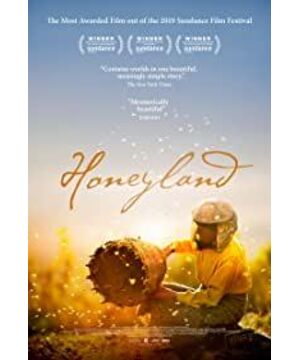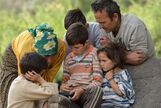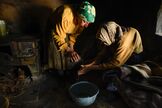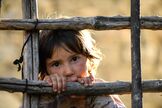This year's Oscar nomination list has been released a few days ago. Apart from some excellent films that have become so popular that the Internet resources are flooded, this time I want to recommend a documentary that can silence the audience and make professionals feel ashamed, that is to win it in one fell swoop This year's Oscar-nominated documentary "Land of Honey" was nominated for Best Documentary Feature and Best International Film. "The Land of Honey" uses audio-visual visual presentations to make the audience truly recognize a life state that is different from itself in a certain corner of the world. It is to elevate the different ways beekeepers and neighbors interact with the environment to a sense of natural philosophy. Historians and critics use words such as confirmation, record, witness, and verification when referring to documentaries, which shows that the purpose of documentaries presented to audiences is to arouse their in-depth thinking about society, life, nature and survival, "The Land of Honey" "done. Bees: Dual Carriers of Representation and Intention In the documentary "The Land of Honey", bees are the biggest image of the whole film, and also the soul of the whole film. At the beginning of the film, Cadiz is carefully abiding by her usual rule of "picking half, keeping half" to gather honey. Surrounding the bees around her, she treats her like a friend, without biting or making noise, just like every day. As a routine, the bees here are figurative, just specific creatures, which the audience can visually capture through the picture, and a creative object that can become a necessities of life for Kadis in reality. material objects. The bee in the film is also a symbol of imagery, it is a kind of spirit and belief, a representative of a unique behavioral object dealing with the natural ecology, it represents "if you follow the rules, I will work hard to produce honey. ” is a symbol of normal natural return, and in the face of the endless demands of neighbors and unscrupulous businessmen from nature, the “spirits” represented by bees give reincarnation-like illnesses, killing the neighbors and their families with an inexorable plague. He has a lot of cows in his family. Throughout the film as a whole, this punishment is carried out by the natural ecology represented by bees on the human beings represented by their neighbors who demand endlessly. This consideration of life and death and the symbiosis of nature and human beings are the ultimate intention of bees. 2. Conflict: The philosophical confrontation between modernity and tradition "The Land of Honey" sounded the last elegy of a group, a nation, and a perseverance. Through the narrative method of comparing the stories of the protagonist Cadiz and the neighbors, they show their completely different emotions towards the natural ecology, reflecting the conflict and confrontation between traditional civilization and modern civilization. The film often uses backlighting to show the majesty and sacredness of bees in Kadis' mind. The high development of material civilization is not the guarantee of people's spiritual satisfaction. The audience can follow the situation in which Kadis entered the city and experience the difference between the traditional civilization she represents and the modern way of life. At the same time, the audience can also receive a certain message conveyed by the film. : The path they live on is completely different from the new age. The philosophy of survival and the wisdom of ecological civilization are the ultimate propositions reflected in this film. During the viewing process, we are glad that the copper smell of modern civilization did not infect Cadiz, but it affected Cadiz because of her being bound by capital and contrary to ecological philosophy. Neighbors living in normal lives are distressed and helpless. Neighbors are facing such a big survival crisis. They have to make excessive demands to maintain a basic life. This is also a last resort tearing of traditional civilization under the progress of modern civilization. This kind of tearing is unsolvable, and the director's "cold-eyed" approach leaves us more thinking and self-questioning. 3. Psychology: Interactive Progression of Loneliness and Warmth "The Land of Honey" expresses the inner world of the traditional beekeepers from beginning to end. This is the way Cadiz's mother behaves, and the same is true after Cadiz inherited her mantle. way of doing things. They are a people who have a heart of reverence for all things in nature, and nature is their eternal belief. Kadis is lonely. When the honeycomb she hid in the tree hole was stolen, she sat behind the tree and wept silently; when her mother died, she became the last female picker in the true sense of the European road. Bee Man, the director is also unique when dealing with the scene of her mother's death. With the cry of Kadi Si, the camera zooms out to a distant view. What we only see at this time is the vast land, only Kadi. The Si family lit an oil lamp, and the rest of the place was pitch-dark. This picture brought the feeling of loneliness and loneliness in Kadisi's life to the fore, allowing the audience to truly feel her lonely and difficult situation. It is an indescribable pain of loneliness. At this moment, the music of the film is also so long and sad... At the end of the film, Cadiz led the audience to the last place where she hid honeycombs on the cliff. She collected a part of the honey in the same way. On the cliff, she and the dog were frolicking and tasting the delicious food given by the ecology. This picture is highlighted by the use of backlighting and warm colors. Kadis showed a smile that he has not seen for a long time. This picture of people living in harmony with nature is moving and makes people feel unparalleled warmth, but it also conveys an indescribable kind of indescribable. The loneliness is a powerlessness for ecological protection, but also a gratification for respecting nature. say at the end
"Honeyland" is strictly a direct film, but it can also be called an anthropological documentary. By telling the story of the last female bee-picker in Europe, the film interprets a loyalist The ecological psychology of the natural person paints a picture of the contradiction and harmony between man and nature, and expresses a principle of survival with awe for all living beings. The last sentence is for everyone: "Spring will definitely come, after all, so many winters have passed."
View more about Honeyland reviews






